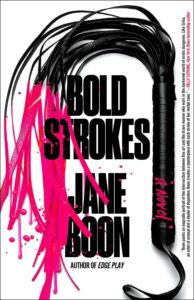Angry, admired by men, and righteous
Bold Strokes
by Jane Boon
Toronto: Regan Arts, 2024
$22.00 / 9781682452288
Reviewed by Jessica Poon
*

I once had a co-worker—let’s call him Dirty Mike—who accused his colleague, diagnosed with hand-foot-and-mouth disease and unable to show up for work, of lying. Dirty Mike believed his colleague’s viral infection was a cover-up for being unable to walk—because he’d been pegged too hard by his girlfriend, who clearly was a dom.
A friend of mine, who is occasionally blue-haired, rocks a septum piercing, and wears glasses, was once told on a dating app: “You would be a great dominatrix.” There was no further explanation.
All this to say, there are a lot of ideas, both tawdry and titillating, ignorant and ill-informed, when it comes to BDSM. It’s entirely possible to live a life where the BDSM exposure comes from Marianne Connell of Sally Rooney’s abnormally successful novel, Normal People, or Dakota Johnson’s Anastasia Steele in 50 Shades of Grey. Needless to say—though I will say it—this is hardly ideal.
And so: If you’ve been craving a depiction of a woman exerting control over a deeply aroused man, look no further than Bold Strokes, fiction by part-time Vancouver resident Jane Boon (Edge Play).
Erika Grieg, an ex-blonde, art gallerist, and dominatrix, is the protagonist of Boon’s provocatively titled second novel. Though Erika has no inclination toward a white picket fence, she’ll happily pick up a leather-tasseled black whip. Her clients are high-powered men who pay through the nose for the chance to kiss her feet. Rather fittingly, the epigraph for Bold Strokes is from Nietzsche: “There is no festival without cruelty.”
Erika’s father periodically shows up to grift her. It’s 2008, and the economy is in the toilet. Fewer people are buying works of art. The separation between Erika’s gallerist’s days and dominatrix’s nights has nothing to do with shame, and everything to do with adhering to narrow ideas of professionalism. A former client is trying to blackmail her, which coincides with her father coming out of prison with a new plan for grifting.
It’s not surprising, then, that when Erika is given the chance to stay in Switzerland with Edouard, a wealthy, art-appreciating client, she says Ja.

Erika’s origin story is thorny. As a teenager, Erika was the assistant, and later, the muse, for her neighbour, whose “stylized paintings of beautiful women, doing very LA things” become supplanted with paintings inspired by Gustav Klimt and then by Erika herself. She eventually steals a painting that depicts her naked, in sexual ecstasy. (This theft reminds me of Emily Ratajkowski’s essay, “Buying Myself Back,” where she explores the questions of how much ownership, if any, a model has in an image of herself and what it means to be a purchasable commodity—and can it ever be an empowering reclamation?)
Once a popular mean girl, Erika falls from social grace when her father goes to prison. She goes brunette—the most classic way to indicate internal darkness, manifested outwardly. She becomes a social cipher. None of this, however, precludes Scott, captain of the football team, from pursuing her.
Erika’s treatment of Scott is the most disturbing part of the book. Although she is careful to point out Scott is much more physically powerful than her, some of their sexual acts seem to be in a grey territory of consent. In her adult dominatrix life, however, Erika’s clients are endlessly besotted and always ridiculously rich.
There are many vicarious pleasures to this book—for one, all the expensive wine Erika drinks. Erika’s canniness when it comes to the precise amount of cleavage an emerging artist should show, or the way she correctly categorizes the most likely collectors of a Damien Hirst artwork (spoiler: predictable rich men who want other predictable rich men to think highly of them) is both amusing and satisfying. At times, the novel feels—and this is praise—like a couple of opinionated art students kvetching while wearing designer clothes—or latex—in Geneva. For instance, in a conversation about artists’ work and their unsavoury personal lives: “Bullies are celebrated everywhere. Consider Steve Jobs. He’s a horror to his employees, but I see you using an iPhone. You also carry a Chanel purse. Karl Lagerfeld is not a nice man.”
One of Erika’s best lines: “I wondered if my best partner would be an eighteen-karat gold vibrator shaped like a dollar sign.” I was irresistibly reminded of Selina Meyer from Veep, played by Julia Louis-Dreyfus, exclaiming, “I want a Cartier fucking dildo!”
Erika’s feminism is emphasized throughout the novel. She speaks with conviction: “It’s staggering that we’re still willing to tolerate these misogynistic bullies, all in the name of art.” At the same time, Erika acknowledges that dreadful “people can make exquisite things, but for me to express that depth of hypocrisy, the things had better be extraordinary.” As a character, Erika would fit perfectly in an Emerald Fennell movie—angry, admired by men, and righteous.
Bold Strokes is never dull—it’s fast-paced and zippy, with striking opening lines: “To see the look I get when I have an orgasm, watch me peel off a little red dot and apply it next to one of the works in my gallery.” On the other hand, tension is scarce. There is, however, a palpable recognition of the possibility of financial precarity for Erika; still, I never truly feared for her life, nor her bank account. I did wonder whether Erika might catch feelings, and if so, whether it would be done in a satisfying way, or whether her character arc would mirror the rather divisive fourth season of Veronica Mars. Of course, the real love of Erika’s life is art.
For anyone in dire need of an antidote from PTSD from Fifty Shades, for those craving the juxtaposition of pleasure and pain with a good dosage of art, this book is for you.

*

Originally from East Vancouver, Jessica Poon is a writer, former line cook, and pianist of dubious merit who recently returned to BC after completing a MFA in Creative Writing at the University of Guelph. [Editor’s note: Jessica Poon has reviewed books by Terese Svoboda, Maia Caron, Wendy H. Wong, Andromeda Romano-Lax, Sarah Leipciger, Katrina Kwan, Shelley Wood, Richard Kelly Kemick, Elisabeth Eaves, Rajinderpal S. Pal, Keziah Weir, Amber Cowie, Robyn Harding, Roz Nay, Anne Fleming, Miriam Lacroix, Taslim Burkowicz, Sam Wiebe, Amy Mattes, Louis Druehl, Sheung-King, Loghan Paylor, Lisa Moore (ed.), Sandra Kelly, and Robyn Harding for BCR]
*
The British Columbia Review
Interim Editors, 2023-25: Trevor Marc Hughes (non-fiction), Brett Josef Grubisic (fiction and poetry)
Publisher: Richard Mackie
Formerly The Ormsby Review, The British Columbia Review is an online book review and journal service for BC writers and readers. The Advisory Board now consists of Jean Barman, Wade Davis, Robin Fisher, Barry Gough, Hugh Johnston, Kathy Mezei, Patricia Roy, Maria Tippett, and Graeme Wynn. Provincial Government Patron (since September 2018): Creative BC. Honorary Patron: Yosef Wosk. Scholarly Patron: SFU Graduate Liberal Studies. The British Columbia Review was founded in 2016 by Richard Mackie and Alan Twigg.
“Only connect.” – E.M. Forster






























